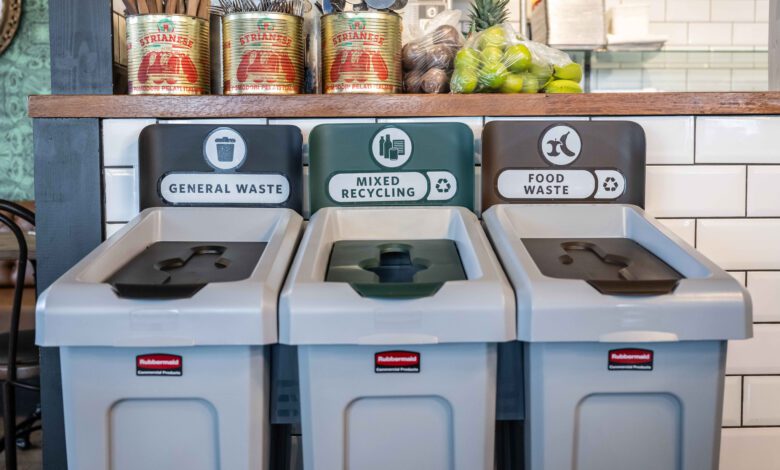Two thirds of hospitality businesses yet to implement major food waste change
With just months to go until new sweeping commercial recycling rules come into force for businesses in England, 93% of hospitality leaders say they are concerned about the impact the legislation will have on their businesses, a new survey has revealed.

From 31 March 2025, new ‘Simpler Recycling’ legislation, being brought in under the Environment Act 2021, will require all businesses with 10 or more employees to separate dry mixed recyclables and food waste from their general waste, prior to collection from their premises. The survey of 250 hospitality businesses, conducted by international waste and recycling manufacturer Rubbermaid Commercial Products (RCP) through Censuswide, showed that while 88% are already separating some waste for recycling, only 34% are currently separating food waste. With 920,000 tonnes of food wasted by hospitality and food service outlets each year1, and the average UK hospitality business spending up to £50,000 every year on sending food waste to landfill2, it’s clear that the industry has some substantial changes to make ahead of the March deadline.
With the food waste recycling mandate meaning hospitality is set to be one of the sectors most impacted by the legislation, respondents reported key concerns about the effect of the legislation on their businesses. Furthermore, just 62% of hospitality SMEs (<250 employees) were actually aware of the changes they need to make, compared with 92% of larger hospitality business (250+ employees) and 78% of SMEs in other sectors.
For large hospitality businesses, the top concern was the timescales to make the changes (55%), followed by cost (51%) and lack of knowledge (49%). Restaurants in particular are worried about timescales (72%), while bars showed concern about a lack of knowledge (64%), and catering companies (55%) and fast food restaurants (54%) said they are most worried about reputation.
While SMEs registered a lower level of concern than larger businesses – 78% vs 97% – (with lower awareness of the legislation), the top concern for these respondents was the cost to implement the changes needed (36%). 31% were worried about the timescales needed to make the changes, with over a fifth saying they thought they’d either miss the 31st March deadline or they did not yet have a planned timescale to make the changes.
Responding to the findings, RCP’s Sustainability and Communications Manager Adriana Olaya Rodriguez commented:
“Of the hospitality and food service businesses we surveyed, 89% said that making recycling improvements was important to them. This is reflective of the businesses we’ve worked with over the past few years, many of which have set themselves ambitious environmental targets with recycling efforts playing a critical role. Despite this, it’s clear that the majority of businesses in the sector have got work to do over the next few months to upgrade their recycling infrastructure and get compliant with the new legislation, especially in relation to food waste recycling.
“We know the hospitality sector has been hit hard in recent years following the pandemic and subsequent hike in operational costs so it’s no surprise that cost was one of the key concerns expressed. My advice, and evidenced by the successes of the businesses we’ve worked with, is that introducing efficient multi-stream recycling throughout a venue actually reduces waste management costs, so the initial investment pays off in the long-term – one leading UK hotel chain we work with is projected to reduce waste management costs by 29% while improving recycling rates by 25%. When you consider the risk of potential fines for not complying with the new rules, the cost benefit only increases.”
Come March 2025, businesses will be required by law to separate waste for recycling, however, getting ahead of the rule changes now could see hospitality businesses reap the benefits of cost savings earlier, while also improving their sustainability credentials. Businesses who are not currently on track to make the changes in time must also consider that landfill taxes are set to rise by 20% in April 20253. What’s more, getting an efficient system into place now gives organisations more time to implement a culture of recycling by training staff and educating customers about how and where to recycle their waste, helping to maximise the sustainability and cost benefits of improved recycling.
To support businesses with getting ready for the changes, RCP has created a series of free resources, starting with this legislation explainer guide: https://www.rubbermaid.eu/en/







